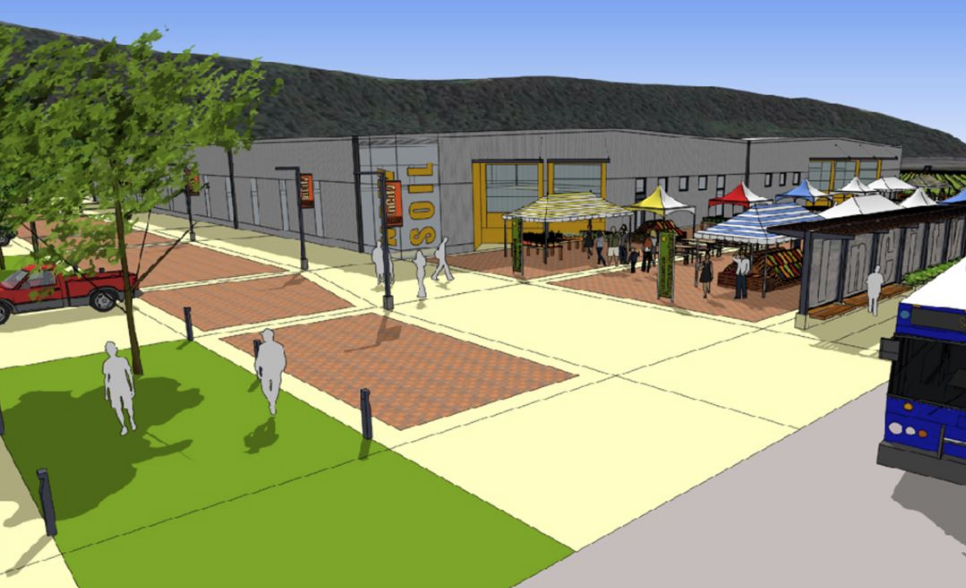Former Steel Site To See Aquaponics Facility
RICH LORD
Pittsburgh Post-Gazette
NOV 11, 2019 rlord@post-gazette.com
To the complex problems of the City of Duquesne and the Mon Valley, entrepreneur Glenn Ford offers a solution that is both down-to-earth and very fishy.
Mr. Ford, of Minneapolis, is the founder of InCity Farms, and on Friday he revealed plans for a 180,000-square-foot aquaponics facility on 25 riverfront acres in Duquesne. Backed by the social impact investors Hollymead Capital, the nonprofit Food 21 and an opportunity zone fund, with Peoples Natural Gas as its chief cheerleader, freshly sprouted InCity Farms is in the process of finding a headquarters in Pittsburgh. Its planned $30 million Duquesne facility is expected to employ 130 — starting salaries around $35,000 — potentially expanding to 275.
“We will try to hire as many of these people as we can from Duquesne and the surrounding area,” Mr. Ford said. “We’re going to take 25 [acres] and we’re going to turn that into, if you will, a little metropolis of food businesses there.”
“I think it could be the starting point for the revitalization of the city of Duquesne and the [Mon Valley] region,” Duquesne Mayor Nickole Nesby said.
Grown-up solutions to combat child poverty
In aquaponics, edible fish are raised in clean, indoor pools, and sold commercially. The waste the fish produce is filtered and treated with beneficial bacteria, and the result is used to fertilize vegetable plants.
The plants are grown indoors in optimal temperature, humidity and light. The technique can support the rapid growth of some 800 vegetable varieties year-round, Mr. Ford said. Add the fish, and you’ve got an economically viable business that also cushions against the food shocks created by global warming.
Both technologically sophisticated and labor-intensive, the field “can be the very first job that someone has, and it can also be [an opportunity for] your Ph.D. with a whole lot of experience,” he said.
Raised in Chicago, Mr. Ford worked his way up to the executive level in Pepsico before leaving to create several food-related companies and to consult for many more. He created a pilot aquaponics site in Minneapolis.
Then he got a call from Pittsburgh.
Peoples spokesman Barry Kukovich had read about aquaponics in National Geographic magazine and introduced the concept to Peoples CEO Morgan O’Brien. They saw the indoor food industry as a potential customer for a natural gas system called Combined Heat and Power, or CHP, in which the fuel is converted to electricity on-site — and as a way to help the local economy.
“We’re interested in the ripple effect of creating more jobs, more employment,” Mr. Kukovich said.
They reached out to Hollymead Capital’s managing partner, Joseph Bute, who happened to know Mr. Ford.
“Morgan [O’Brien] said, ‘I want this here, and I don’t want to waste a lot of time looking for the perfect solution,’” Mr. Bute recounted.
That doesn’t mean Duquesne isn’t the perfect solution.
It has large amounts of vacant land, much owned by the nonprofit Regional Industrial Development Corp. The city has a population of 5,500, of which more than one-third (including around 750 kids) are in poverty.
The entry-level, living-wage jobs would be “outstanding, to a community where you have a large group of people, one, with a learning disability, and two, with a criminal background,” Duquesne Mayor Nikole Nesby said.
A child of a modest Chicago neighborhood, Mr. Ford understands that situation.
“In my DNA, I know that people need scenarios where they can work their way out of their circumstances,” he said. “That’s what I want my business to be known for.”
He said 75% of the initial jobs require only that the applicant be “reliable and trainable.”
Low-income communities, he said, often suffer from a negative “balance of trade” because they sell little to the wider world and buy goods and foods that are made far away.
“Until we can start to balance that out a little bit better, we create permanent dysfunction, permanent ghettos, permanent poverty,” he said.
He said aquaponics can restore some balance, letting those communities buy food grown nearby, and giving them a product to sell to the world.
A nonprofit called Food21, created last year will help to coordinate InCity Farms’ growing plans with those of local farmers. That way they won’t be competing to sell the same vegetables at the same time. Instead, they can coordinate to meet a buyer’s needs year-round — for instance, providing traditionally grown tomatoes in summer, and aquaponics product in the winter.
InCity Farms is scouting for other sites, likely including Erie, Pa. But Duquesne comes first.
Mr. Ford said he has an agreement with RIDC to purchase 25 acres of the former Duquesne Steel Works site. He is looking for a public subsidy only for an amphitheater that he hopes will make the site a riverfront destination.
“This is the start of something meaningful and beautiful,” Ms. Nesby said.
Rich Lord: rlord@post-gazette.com or 412-263-1542.







